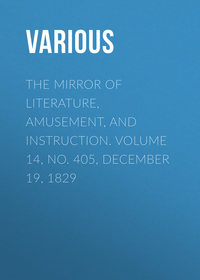The Mirror of Literature, Amusement, and Instruction. Volume 14, No. 405, December 19, 1829

Полная версия
Добавить В библиотекуАвторизуйтесь, чтобы добавить
Добавить отзывДобавить цитату
The Mirror of Literature, Amusement, and Instruction. Volume 14, No. 405, December 19, 1829
Авторизация